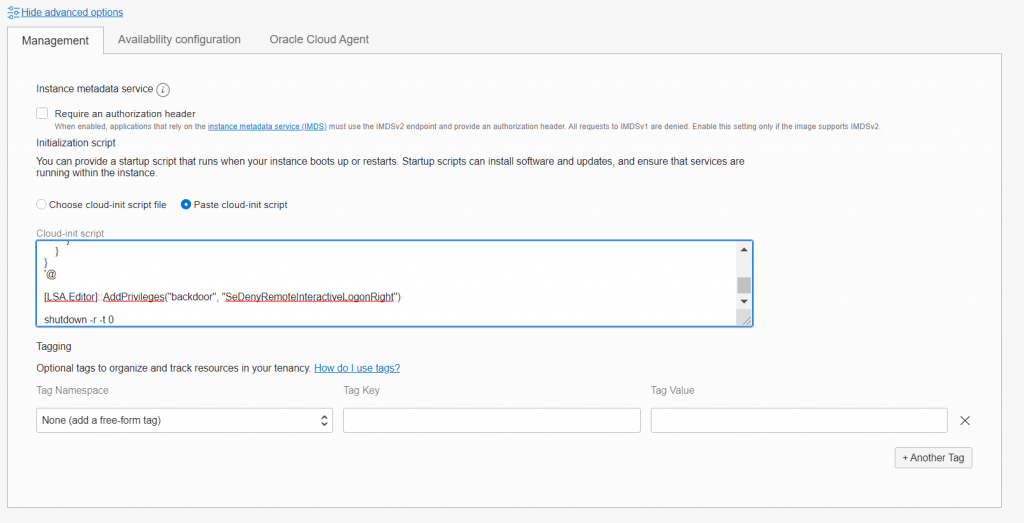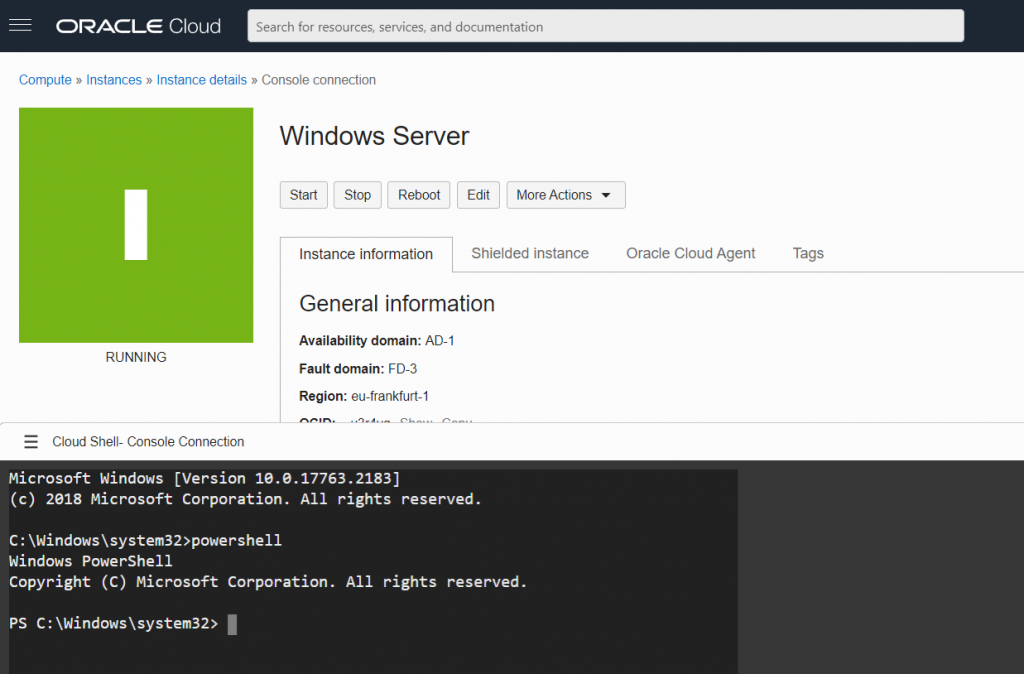For a long time you can create console sessions to your VM and BM compute instances in OCI. This is a remote KVM method like HP iLO or dell DRAC. Not relying on networking you can still connect to your instance. Traditionally to enable a remote console session to your windows instances, you had to setup a SSH tunnel and via that tunnel to run a VNC session to get a graphical environment to access your instance.
NEW in OCI: Embedded Serial Console session direct from the OCI Web portal.
Using the new Embedded Serial Console in OCI you can also make it possible to access your Windows Instances. Of course not via a graphical screen, but a command prompt or powershell environment.
In order to make this possible we need to do a few things:
- Enable Serial access for the Windows Special Administration Console (SAC)
- Create a backdoor user with a password
- Give backdoor user administrator rights
- DISABLE backdoor user from having access via RDP
- Hide all default username from the RDP login screen
I have created a cloud-init script that you can use when you are deploying a new windows instance. The script will make all those changes on first boot and then reboots once more to enable the serial console.
You can paste in the cloud-init script when you create your windows instance at the bottom in the Advanced Section.

After that you have command line / powershell access to the windows instance via the SAC.

In the SAC type in the following commands:
cmd
ch -si 1After that hit enter 2x and you get a login prompt. You can now login with the user backdoor, leaving the domain name empty (local user) and use the password 1LoveOracle!! (Change this in the cloudinit script on line 8)
Now you have command prompt and can start the powershell console if you need that.

Below is the windows cloud-init script:
#ps1_sysnative
bcdedit /ems "{current}" on
bcdedit /emssettings EMSPORT:1 EMSBAUDRATE:115200
bcdedit /set "{bootmgr}" displaybootmenu yes
bcdedit /set "{bootmgr}" timeout 15
bcdedit /set "{bootmgr}" bootems yes
$Secure_String_Pwd = ConvertTo-SecureString "1LoveOracle!!" -AsPlainText -Force
New-LocalUser -name "Backdoor" -Description "Backdoor user" -Password $Secure_String_Pwd
Add-LocalGroupMember -Group "Administrators" -Member "backdoor"
Set-Itemproperty -Path HKLM:\SOFTWARE\Microsoft\Windows\CurrentVersion\Policies\System -Name dontdisplaylastusername -value 1
Add-Type @'
using System;
using System.Collections.Generic;
using System.Text;
namespace LSA
{
using System.Runtime.InteropServices;
using System.Security;
using System.Management;
using System.Runtime.CompilerServices;
using System.ComponentModel;
using LSA_HANDLE = IntPtr;
[StructLayout(LayoutKind.Sequential)]
struct LSA_OBJECT_ATTRIBUTES
{
internal int Length;
internal IntPtr RootDirectory;
internal IntPtr ObjectName;
internal int Attributes;
internal IntPtr SecurityDescriptor;
internal IntPtr SecurityQualityOfService;
}
[StructLayout(LayoutKind.Sequential, CharSet = CharSet.Unicode)]
struct LSA_UNICODE_STRING
{
internal ushort Length;
internal ushort MaximumLength;
[MarshalAs(UnmanagedType.LPWStr)]
internal string Buffer;
}
sealed class Win32Sec
{
[DllImport("advapi32", CharSet = CharSet.Unicode, SetLastError = true),
SuppressUnmanagedCodeSecurityAttribute]
internal static extern uint LsaOpenPolicy(
LSA_UNICODE_STRING[] SystemName,
ref LSA_OBJECT_ATTRIBUTES ObjectAttributes,
int AccessMask,
out IntPtr PolicyHandle
);
[DllImport("advapi32", CharSet = CharSet.Unicode, SetLastError = true),
SuppressUnmanagedCodeSecurityAttribute]
internal static extern uint LsaAddAccountRights(
LSA_HANDLE PolicyHandle,
IntPtr pSID,
LSA_UNICODE_STRING[] UserRights,
int CountOfRights
);
[DllImport("advapi32", CharSet = CharSet.Unicode, SetLastError = true),
SuppressUnmanagedCodeSecurityAttribute]
internal static extern int LsaLookupNames2(
LSA_HANDLE PolicyHandle,
uint Flags,
uint Count,
LSA_UNICODE_STRING[] Names,
ref IntPtr ReferencedDomains,
ref IntPtr Sids
);
[DllImport("advapi32")]
internal static extern int LsaNtStatusToWinError(int NTSTATUS);
[DllImport("advapi32")]
internal static extern int LsaClose(IntPtr PolicyHandle);
[DllImport("advapi32")]
internal static extern int LsaFreeMemory(IntPtr Buffer);
}
public sealed class LsaWrapper : IDisposable
{
[StructLayout(LayoutKind.Sequential)]
struct LSA_TRUST_INFORMATION
{
internal LSA_UNICODE_STRING Name;
internal IntPtr Sid;
}
[StructLayout(LayoutKind.Sequential)]
struct LSA_TRANSLATED_SID2
{
internal SidNameUse Use;
internal IntPtr Sid;
internal int DomainIndex;
uint Flags;
}
[StructLayout(LayoutKind.Sequential)]
struct LSA_REFERENCED_DOMAIN_LIST
{
internal uint Entries;
internal LSA_TRUST_INFORMATION Domains;
}
enum SidNameUse : int
{
User = 1,
Group = 2,
Domain = 3,
Alias = 4,
KnownGroup = 5,
DeletedAccount = 6,
Invalid = 7,
Unknown = 8,
Computer = 9
}
enum Access : int
{
POLICY_READ = 0x20006,
POLICY_ALL_ACCESS = 0x00F0FFF,
POLICY_EXECUTE = 0X20801,
POLICY_WRITE = 0X207F8
}
const uint STATUS_ACCESS_DENIED = 0xc0000022;
const uint STATUS_INSUFFICIENT_RESOURCES = 0xc000009a;
const uint STATUS_NO_MEMORY = 0xc0000017;
IntPtr lsaHandle;
public LsaWrapper()
: this(null)
{ }
public LsaWrapper(string systemName)
{
LSA_OBJECT_ATTRIBUTES lsaAttr;
lsaAttr.RootDirectory = IntPtr.Zero;
lsaAttr.ObjectName = IntPtr.Zero;
lsaAttr.Attributes = 0;
lsaAttr.SecurityDescriptor = IntPtr.Zero;
lsaAttr.SecurityQualityOfService = IntPtr.Zero;
lsaAttr.Length = Marshal.SizeOf(typeof(LSA_OBJECT_ATTRIBUTES));
lsaHandle = IntPtr.Zero;
LSA_UNICODE_STRING[] system = null;
if (systemName != null)
{
system = new LSA_UNICODE_STRING[1];
system[0] = InitLsaString(systemName);
}
uint ret = Win32Sec.LsaOpenPolicy(system, ref lsaAttr,
(int)Access.POLICY_ALL_ACCESS, out lsaHandle);
if (ret == 0)
return;
if (ret == STATUS_ACCESS_DENIED)
{
throw new UnauthorizedAccessException();
}
if ((ret == STATUS_INSUFFICIENT_RESOURCES) || (ret == STATUS_NO_MEMORY))
{
throw new OutOfMemoryException();
}
throw new Win32Exception(Win32Sec.LsaNtStatusToWinError((int)ret));
}
public void AddPrivileges(string account, string privilege)
{
IntPtr pSid = GetSIDInformation(account);
LSA_UNICODE_STRING[] privileges = new LSA_UNICODE_STRING[1];
privileges[0] = InitLsaString(privilege);
uint ret = Win32Sec.LsaAddAccountRights(lsaHandle, pSid, privileges, 1);
if (ret == 0)
return;
if (ret == STATUS_ACCESS_DENIED)
{
throw new UnauthorizedAccessException();
}
if ((ret == STATUS_INSUFFICIENT_RESOURCES) || (ret == STATUS_NO_MEMORY))
{
throw new OutOfMemoryException();
}
throw new Win32Exception(Win32Sec.LsaNtStatusToWinError((int)ret));
}
public void Dispose()
{
if (lsaHandle != IntPtr.Zero)
{
Win32Sec.LsaClose(lsaHandle);
lsaHandle = IntPtr.Zero;
}
GC.SuppressFinalize(this);
}
~LsaWrapper()
{
Dispose();
}
IntPtr GetSIDInformation(string account)
{
LSA_UNICODE_STRING[] names = new LSA_UNICODE_STRING[1];
LSA_TRANSLATED_SID2 lts;
IntPtr tsids = IntPtr.Zero;
IntPtr tdom = IntPtr.Zero;
names[0] = InitLsaString(account);
lts.Sid = IntPtr.Zero;
Console.WriteLine("String account: {0}", names[0].Length);
int ret = Win32Sec.LsaLookupNames2(lsaHandle, 0, 1, names, ref tdom, ref tsids);
if (ret != 0)
throw new Win32Exception(Win32Sec.LsaNtStatusToWinError(ret));
lts = (LSA_TRANSLATED_SID2)Marshal.PtrToStructure(tsids,
typeof(LSA_TRANSLATED_SID2));
Win32Sec.LsaFreeMemory(tsids);
Win32Sec.LsaFreeMemory(tdom);
return lts.Sid;
}
static LSA_UNICODE_STRING InitLsaString(string s)
{
if (s.Length > 0x7ffe)
throw new ArgumentException("String too long");
LSA_UNICODE_STRING lus = new LSA_UNICODE_STRING();
lus.Buffer = s;
lus.Length = (ushort)(s.Length * sizeof(char));
lus.MaximumLength = (ushort)(lus.Length + sizeof(char));
return lus;
}
}
public class Editor
{
public static void AddPrivileges(string account, string privilege)
{
using (LsaWrapper lsaWrapper = new LsaWrapper())
{
lsaWrapper.AddPrivileges(account, privilege);
}
}
}
}
'@
[LSA.Editor]::AddPrivileges("backdoor", "SeDenyRemoteInteractiveLogonRight")
shutdown -r -t 0
Thank you to Jordan Mills, Roel van Lisdonk and Willy Denoyette for providing the completed method to Disable RDP access via powershell: https://jordanmills.wordpress.com/2014/07/31/change-local-user-rights-assignment-from-powershell/
You can find the Windows and Linux cloud init scripts also on my github page:
https://github.com/AnykeyNL/OCI-Cloudinit-Backdoors